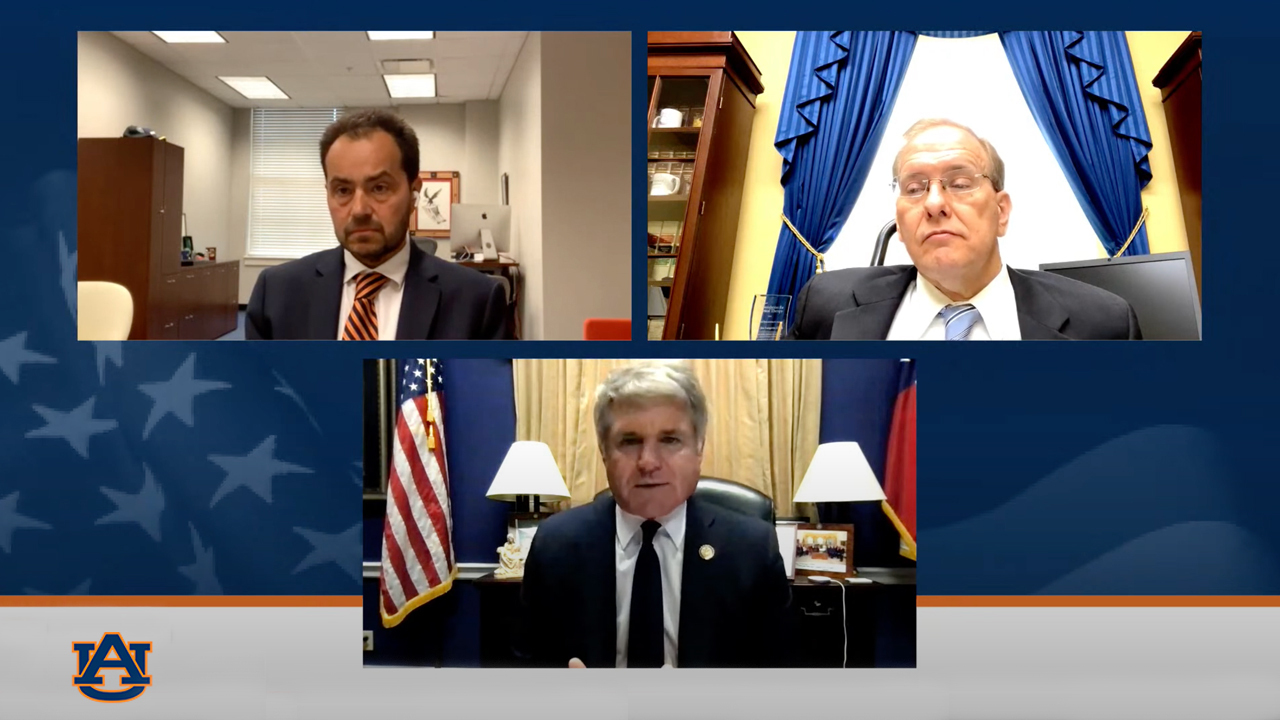Bipartisan lawmakers discuss impact of Cyber Diplomacy Act in addressing international threats
Published: Apr 16, 2021 7:35 AM
By Cassie Montgomery
In a bipartisan discussion hosted by Auburn University’s McCrary Institute on Thursday, U.S. Reps. Jim Langevin, D-R.I., and Michael McCaul, R-Texas, outlined the potential impact that passing the Cyber Diplomacy Act of 2021 would have for governmental agencies fighting against international cyberattacks.
The legislation, which has advanced out of committee and will head to the full House for consideration in late April, establishes an Office of International Cyberspace Policy within the State Department and aims to protect American international leadership on cybersecurity.
“This bill will give the State Department the resources it needs to work with our allies and partners to address cybersecurity issues,” said McCaul, ranking member on the House Foreign Affairs Committee. “I believe it is critical that we work with our allies around the world, not only to fight against our adversaries but to promote our shared goals of freedom.”
Langevin, who serves as a member of the U.S. Cyberspace Solarium Commission and chairman of the House Armed Services Committee’s subcommittee on cyber, innovative technologies and information systems, described the act as a “whole government approach that can bring multiple instruments to bear to counter authoritarian pressure and lead with our democratic ideals.
“This is a major step forward in defining and implementing a coherent and concerted diplomatic effort,” Langevin said. “This act reinforces our commitment to human rights, democracy and the rule of law and with this clear vision, our leaders will be authorized to pursue those necessary objectives to clarify norms and standards implementing commitments on responsible country behavior and reducing the risk of escalation in cyberspace.”
The 2021 bill revives legislation introduced during the previous two Congresses. It would establish an ambassador-at-large position to represent the Office of International Cyberspace Policy abroad.
“The act will put us in a much stronger position on the international stage where we have been absent in a lot of ways on international policy or in rulemaking bodies,” Langevin said. “Reasserting ourselves with a high-level, high-ranking ambassador-level position representing the nation and our interests on the international stage, with an appropriate bureau to back up that person and personnel with the expertise, will effectively help with the rulemaking and norm-setting.”
The legislators described the role of the ambassador-at-large and the director of the Cybersecurity and Infrastructure Security Agency (CISA) as complementary when it comes to evaluating, and swiftly addressing, cybersecurity threats to public and private entities.
“CISA can share with this ambassador what the current threat landscape is … and then the ambassador can make the decisions on presidential recommendations for things like sanctions and working with other nations like our allies in terms of what appropriate standards of conduct are in this space,” McCaul said.
The full talk can be viewed below:
The virtual event was moderated by Frank Cilluffo, Cyberspace Solarium Commission member and director of the McCrary Institute for Cyber and Critical Infrastructure Security. The McCrary Institute is focused on practical, interdisciplinary research and innovation in infrastructure and cybersecurity. Founded through a gift from the Alabama Power Foundation in 2014, the institute is tasked with developing next-generation technologies aimed at improving the security and operation of the nation’s infrastructure.
Media Contact: , cmontgomery@auburn.edu, 334.844.3668
Clockwise from top left: McCrary Institute Director Frank Cilluffo, Rep. Jim Langevin, D-R.I., and Rep. Michael McCaul, R-Texas.


